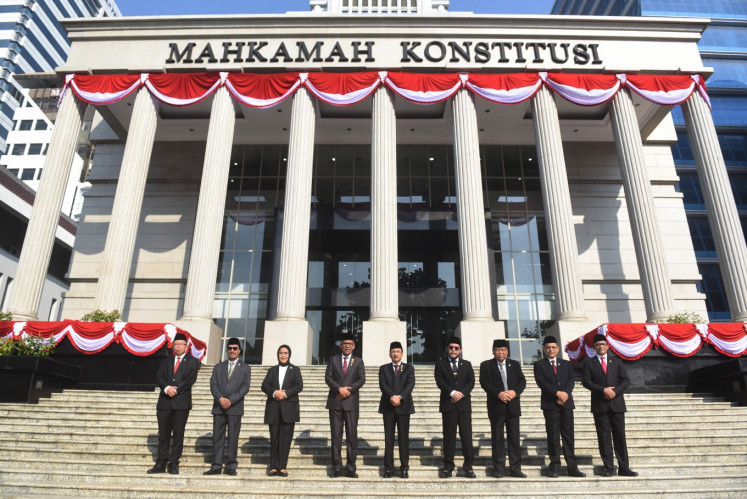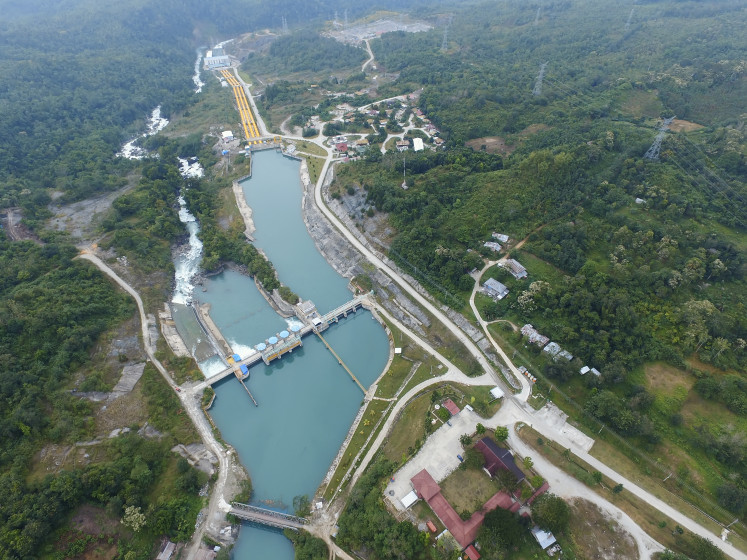Popular Reads
Top Results
Can't find what you're looking for?
View all search resultsPopular Reads
Top Results
Can't find what you're looking for?
View all search resultsDelivering structural transformation to Indonesia
Reforms cannot simply be “sent”; they have to be “delivered”
Change text size
Gift Premium Articles
to Anyone

R
eforms cannot simply be “sent”; they have to be “delivered”. That is what President Joko “Jokowi” Widodo envisions as he embarks on his second term. He will need this determination to achieve one of his biggest priorities this time around: structural reform.
“We have to transform our dependence on natural resources into competitive and modern manufacturing and service capabilities,” he explained. This is something that the government has championed for years, but using the President’s own language, Indonesia’s “structural reform” has only been sent. It has yet to be delivered.
Today, 60 percent of our exports of merchandise still come from agriculture, minerals and metals. This reality is more jarring when we look at our neighbors. Vietnam’s biggest exports are TV and radio transmitters, and electronic microcircuits are the chief exports of the Philippines, Malaysia and Singapore. Indonesia’s are palm oil and coal, which make up more than 20 percent of our exported merchandise.
The main problem with relying on raw commodities is that their prices are inherently volatile. The fleeting ecstasies of commodity booms are followed by excruciating crashes. At the peak of the last commodity boom in 2011, our economy grew 6.5 percent. When the boom went bust in 2014, our growth fell below 5 percent.
What makes this predicament all the more frustrating is that everyone is aware, including policymakers, that no country has managed to sustain long-term growth by relying on raw commodities alone. Yet like an inveterate junkie, our country cannot kick its natural-resource addiction.
The government could [...] establish industrial zones [...] outside of Java, where wages are lower because of lower living costs.
In his inaugural address, the President warned of the dangers of getting stuck in routine. This is equally true if we want to truly break our resource curse.
To encourage structural transformation, the President has come up with a laudable list of reforms, including revisions to the Labor Law. This is clearly a step in the right direction, but we are still at risk of repeating the failures of other “reforms”.
For instance, the government offers fiscal incentives, such as tax holidays, to entice investment. However, between 2016 and 2017, not a single investor made use of the tax holiday. Reform is not enough; we must reform how we execute our policy reforms.
Moving forward, the government should consider taking three critical steps. First, it should identify high-priority sectors that have the most impact on our structural transformation. These are not just sectors that have greater added value.
They must also be closely related to our existing production capabilities. Harvard Growth Lab has done just that. It identifies products that are not only desirable for Indonesia’s structural transformation but are also feasible. These products include chemical elements for electronics, parts for office machines and integrated electronic circuits.
Second, the government should intensify its engagement with potential investors in the already-identified key sectors. This way, it can offer “carrots” that investors find truly appealing. The failure of our fiscal incentives shows how the government should have engaged more deeply with the private sector.
The government cannot just come up with policy reforms unilaterally and expect that the reforms will automatically bring the investors in. The government should reach out more extensively to investors and include them in the process, from policy formulation to execution.
With regard to the Labor Law, the government should consider what investors say is their biggest problem. If the law’s hefty severance payment requirement is the problem, then we should revise it.
However, if the minimum wage is the real problem, rather than revising the law the government could work to establish industrial zones with the necessary infrastructure outside of Java, where wages are lower because of lower living costs.
Finally, the government should not just offer carrots. It should be more confident in its use of “sticks” to spur structural transformation. These sticks include policies such as local content requirements and raw commodities export bans. Of course, investors will initially balk at them, but we have to realize that, as the biggest market in Southeast Asia, we have tremendous leverage.
The investors need us as much as we need them. Carrots alone will not cut it. Many international-brand smartphones are now made in Indonesia. This is not because of our investment incentives but because our 30 percent local-content requirement for 4G smartphones. Carrots and sticks are not substitutes; they are complements.
The President hit the nail on the head when he made structural transformation a major priority for his administration.
Let’s hope he won’t just hit the send button but ensure that Indonesia’s structural transformation is actually delivered.
_____________________
Master's candidate in Public Policy at the Harvard Kennedy School of Government concentrating in trade and industrial policy









